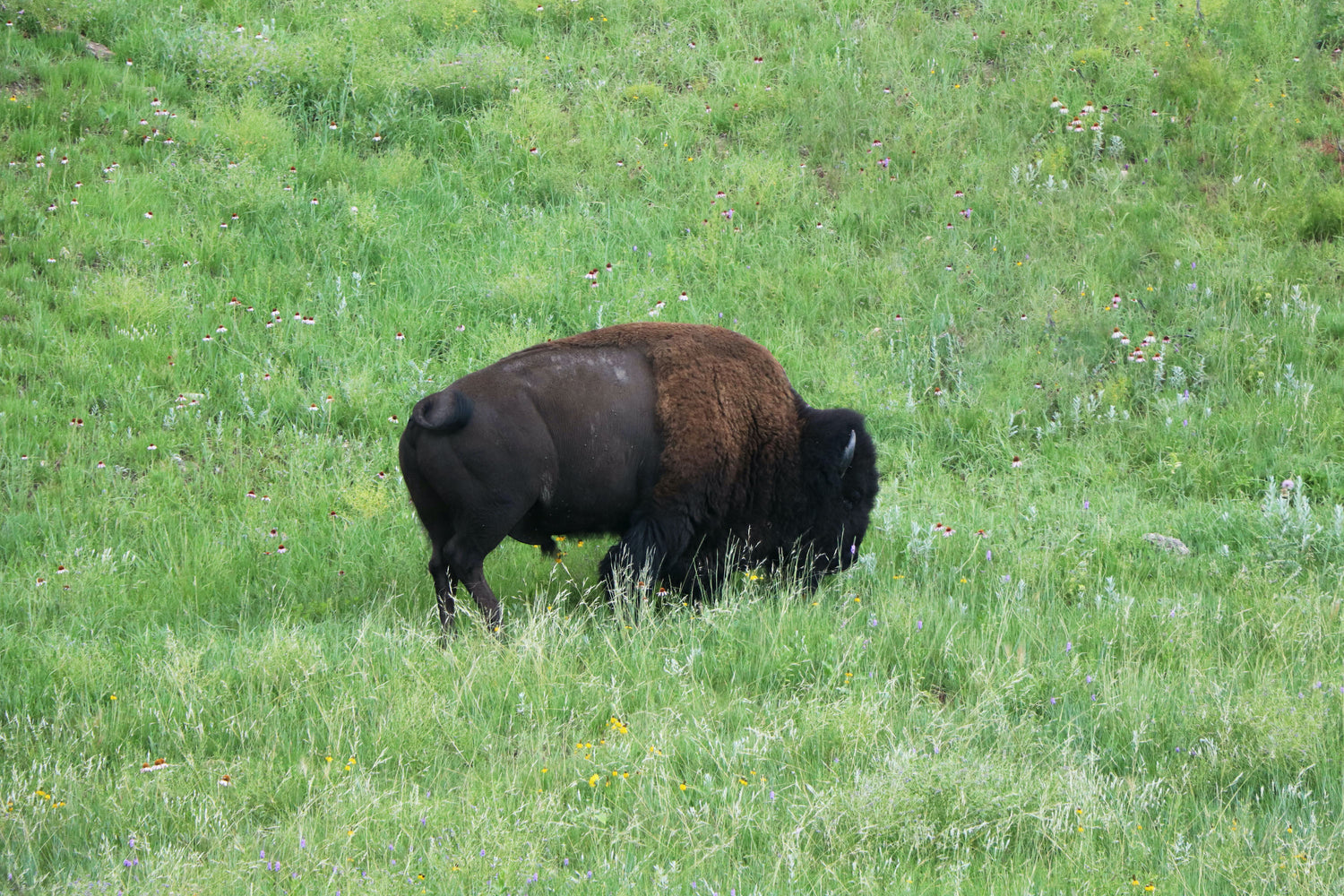Bison Compost Information
Bison and cow composts have different microbial populations due to the different diets and digestive systems of the animals. Bison are herbivores, while cows are omnivores, and this difference in diet can result in variations in the types and amounts of microbes present in their manure.
Bison manure typically has a higher proportion of microbes that are beneficial for plant growth, such as nitrogen-fixing bacteria, as well as a more diverse microbial population overall. This is due in part to the bison's diet, which consists mostly of grasses and other plants.
In contrast, cow manure may have a higher proportion of pathogens and potentially harmful bacteria due to their diet which may include a mix of grass and grains.
Nutrient-rich: Bison compost is a rich source of nitrogen, phosphorus, and potassium, as well as other micronutrients, which makes it an effective fertilizer for a wide range of plants.- Safe and pathogen-free: Bison manure is less likely to contain pathogens compared to other types of manure, making it a safe and effective soil amendment for use in gardens, lawns, and farm fields.
- Improves soil structure: Bison compost can help to improve soil structure and fertility, which can lead to healthier plants with more robust root systems.
- Suppresses pests and weeds: Bison compost can help to suppress pests and weeds, making it a beneficial addition to gardens and lawns.
- Diverse microbe population: Bison eat a wide variety of plants, which means that their manure will contain a diverse mix of beneficial microbes.
- Organic : Bison compost is an organic fertilizer that is safe to use in organic farming and gardening.
- Sustainable: Bison compost is a sustainable option that helps to recycle organic materials and reduce waste.
- High-quality : Bison compost is a high-quality soil amendment that can provide important nutrients and beneficial microbes to plants, resulting in healthier and more productive plants.
This makes bison compost a valuable addition to any farming, gardening, or landscaping project, and it's a great choice for those who are looking for an organic, sustainable, and high-quality soil amendment.
Bison composts can be effective soil amendments, but the specific microbial population and nutrient content will depend on the specific materials used to make the compost and the composting method used.
Bison Compost Tea & Spreading Bison Compost In Field
Bison compost tea and spreading bison compost directly in a field are both methods for applying bison compost to plants, but they have different benefits and uses.
Bison compost tea is a liquid solution made by steeping bison compost in water. The solution is rich in beneficial microbes, including bacteria, fungi, and protozoa. These microbes can help to improve plant health by increasing their immunity to disease, boosting their nutrient uptake and helping to break down organic matter in the soil. When applied as a foliar spray, the compost tea can also help to protect plants from pests and diseases.
Spreading bison compost directly in a field, on the other hand, is a way to amend the soil with bison compost. Bison compost can be spread on top of the soil and incorporated into the soil by tilling or cultivating. This method can improve soil structure, fertility, and help to suppress weeds and pests. The microbe population in the bison compost will be diverse, this is because bison eat a wide variety of plants, which means that their manure will contain a diverse mix of beneficial microbes.
Bison compost tea is a liquid solution that can be applied directly to plants to boost their health and nutrient uptake, while spreading bison compost directly in a field is a way to amend the soil to improve its structure and fertility. Both methods can be used together, but they have different benefits and uses. The bison compost tea will contain a higher concentration of beneficial microbes than spreading the bison compost directly in the field, but the latter method will have a more diverse population of microbe.
- Reduced fertilizer costs: Bison compost is a rich source of nitrogen, phosphorus, and potassium, as well as other micronutrients, which means that you can use less commercial fertilizer when you use bison compost.
- Reduced water costs: Bison compost can help to improve soil structure and fertility, which can lead to better water retention and more efficient use of water.
- Reduced pest and weed control costs: Bison compost can help to suppress pests and weeds, reducing the need for costly pest and weed control measures.
- Increased crop yields: Bison compost can help to improve plant health and increase crop yields, which can lead to increased profits from your farm or garden.
- Long-term savings: Bison compost can improve the overall health and productivity of your soil, which can lead to long-term savings on fertilizer, water, and pest and weed control costs.
- Reduced waste management costs: By using bison compost, you can reduce the amount of organic waste that needs to be disposed of, which can lead to significant savings on waste management costs.
- Organic: Bison compost is an organic fertilizer that is safe to use in organic farming and gardening.
- Sustainable: Bison compost is a sustainable option that helps to recycle organic materials and reduce waste.
Using bison compost can save money by reducing the need for commercial fertilizer, water, pest and weed control, and waste management. Additionally, by improving the soil structure, fertility and crop yields, it can increase the overall profitability of your farm or garden in the long-term.

